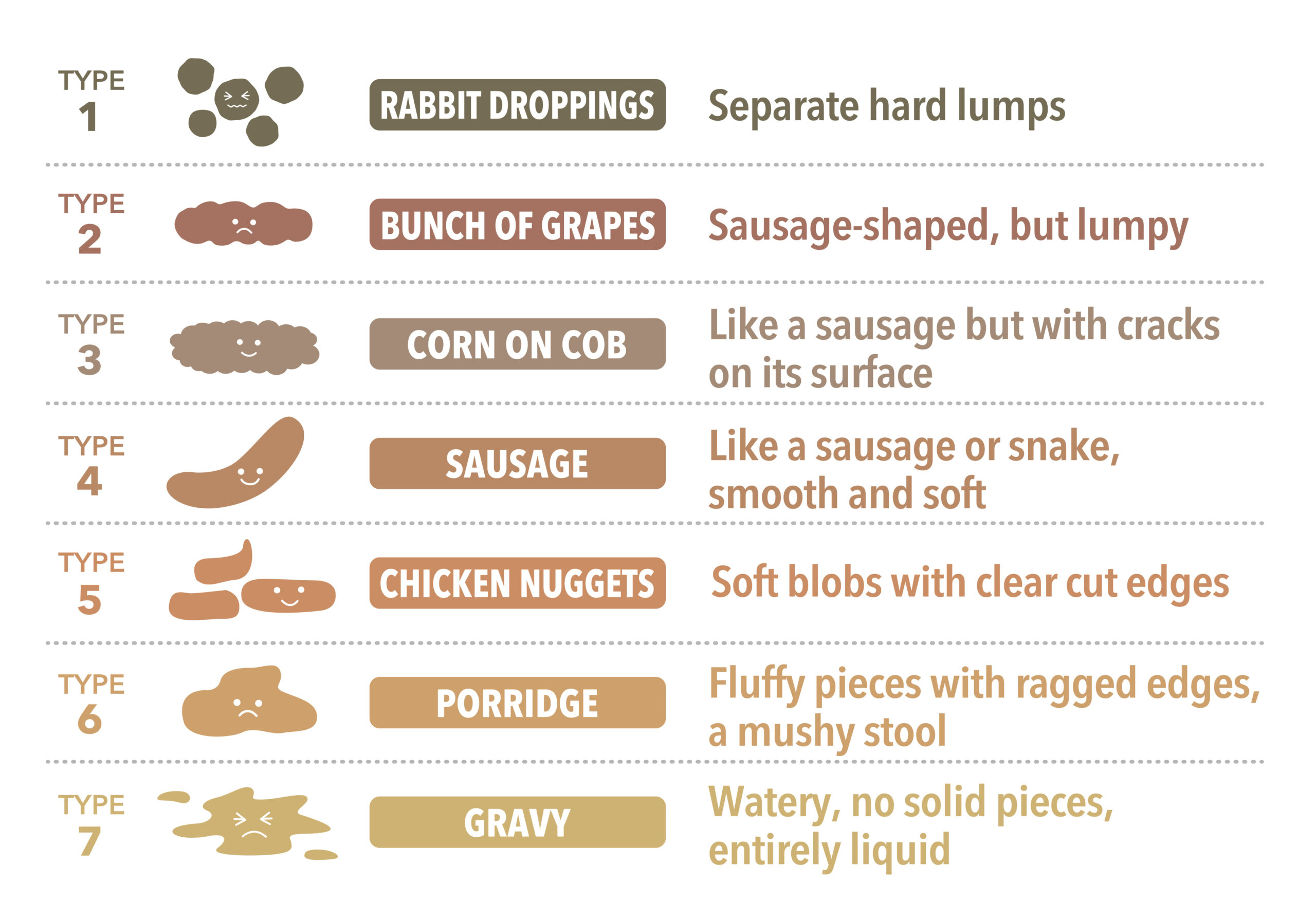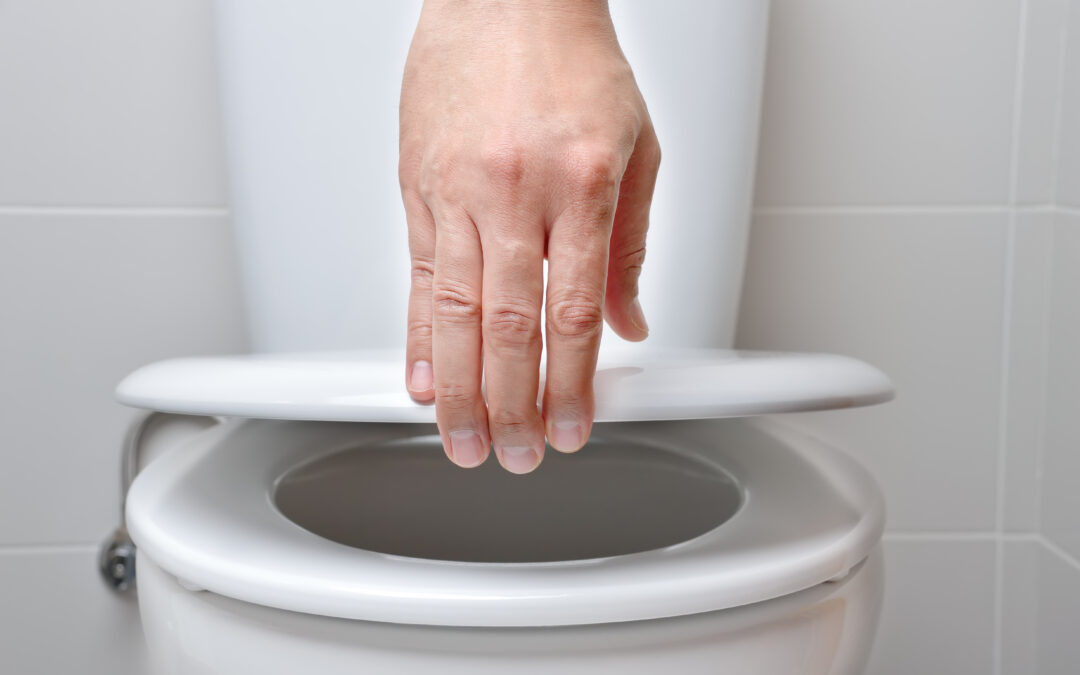The best way to have an idea of your gut health is to look at your stool. Although unappealing as it may sound, we all do it so let’s get over the stigma of talking about it!
Many different stool analysis tests exist to get a thorough look at what is going on but you can get a pretty good idea of your gut health with simple observation. Take a look at the Bristol Stool Chart below, if you have type 1 or 2 you have constipation, 3-4 is normal and 5-7 is loose stool which means there is inflammation. Let’s look at these two problematic scenarios in further detail.

Inflammation
Inflammation is enemy number one of the microbiome and it can eventually lead to leaky gut or can be a symptom of SIBO (small intestinal bacteria overgrowth). It can also throw off your microbiome, helping the proliferation of bad bacteria and reducing your healthy bacteria. Eating to reduce inflammation is more important than eating to feed gut bacteria because this inflamed gut is what is putting oil to the flame of bad bacteria. The best way to address inflammation is to look into the cause. This can be a gut disrupter listed above. To better pinpoint the culprit an elimination can be done. The following are foods and spices that help sooth inflammation. The digestive tract is leading cause of inflammation in the body and when the gut is inflamed it causes inflammation throughout the body, possibly leaving us with symptoms such as fatigue, brain fog, insomnia, skin conditions, hormone imbalance, depression or anxiety, hypothiroidism.
Gut Disrupters
Our gut can be damaged from many things such as pharmaceutical drugs (antibiotics, reflux medication, hormones, anti-inflammatories…). Gut damage results in inflammation in the gut.
Foods that Disrupt the Gut
- Artificial sweeteners
- Sugar (including stevia)
- Artificial flavors
- Processed foods
- Alcohol
- Dairy
- Inflammatory cooking oil (corn, canola, soy, sunflower, rice, safflower, grapeseed)
- Grains; if you do it grains eat whole grains preferably non-gluten and organic
- Legumes (unless soaked or pressure cooked)
- Food sensitivities and intolerances
Herbs and Spices that can help Reduce Inflammation:
- Turmeric
- Ginger
- Peppermint
- Marshmallow root tea
- Licorice root tea
Fats to Calm Inflammation
- Avocado, avocado oil
- Coconut oil, coconut
- Olives & olive oil
- Ghee (organic, grass fed)
- Flax
- Chia seeds
- Almonds, macadamia nuts, Walnuts
Constipation
On the other spectrum, constipation can be just as burdensome as diarrhea. Many things may affect your regularity:
- ignoring or delaying the urge to have a bowel movement
- a change in your daily schedule;
- sedentary lifestyle and lack of exercise,
- vacation and travel,
- stress or other forms of emotional distress,
- underweight or overweight,
- if you are a women, the last phase of your cycle, before menstruations when there is more progesterone in your circulation is notorious for causing constipation,
- pregnancy is a period when many woman suffer from constipation
- hypothyroidism.
Regular elimination affects our mood, health and wellbeing as the intestines are an important outlet for toxins. When you are not eliminating regularly (meaning at least once per day) these toxins are reabsorbed into your circulation and your body has to work extra hard to cleanse itself. Other ailments can occur due to this; such as headaches, migraines, heart burn can worsen, skin ailments, hemorrhoids…
Actions to Prevent Constipation
- Prebiotics and Fiber: No supplements needed. Think fresh vegetables, fruits, whole grains, legumes, nuts, seeds. My top fibrous favorites for constipation: celery leak, prunes, oatmeal (not instant), all legumes (beans). If you need extra help, add a table spoon of flax, chia or psyllium to your morning breakfast.
- Avoid foods and drinks that constipate: ripe bananas, caffeine containing drinks: on top of dehydrating you these make your bowel lazy and dependent. Low fiber foods such as: dairy, refined grains (white carbohydrates), fatty foods, sugary foods.. If you eat meat, make sure to serve with an abundance of fiber containing foods (i.e. green leafy vegetables.
- Water: Your drain is blocked, you are throwing little sticks down but it only seems to be making matters worse. The same thing happens when you increase your fiber consumption but do not drink any water. Moral of the story: water will help you eliminate toxins with your urine and feces.
- Exercise:
- Involve a ‘thumping’: jogging, walking, sports that involve running. These help gravity take its course
- Yoga poses such as down dog
- Stretching: before going to be try lying on your back and bringing one knee as close your chest as possible for 5 seconds, alternate with the other leg. Do this for 5 minutes
- Having a regular routine
- Probiotics
More Fun Feces Facts !
Other than the things mentioned in the Bristol Stool Diagram you may have observed undigested food in your stool or an oil ring in the toilet bowl after bowel movement.
Both of these indicate that certain foods were not properly absorbed. The oil ring meaning difficulty absorbing fat and the other foods perhaps starchy vegetables. In order for foods to be properly absorbed they must first be properly digested in the mouth, stomach and small intestine. Optimal digestion is done in a calm state (so that your digestive enzymes are activated), chewing the food properly. It is crucial to above all make sure the microbiome is functioning optimally.. If digestion is not ameliorated by doing the above, bitters can be introduced before a meal and furthermore digestive enzyme supplements may help.
Conclusion
In both cases of loose and hard stool, for optimal gut health the microbiome needs to be looked at and cared for, for more information on how to do this check out the article on feeding your microbiome.


